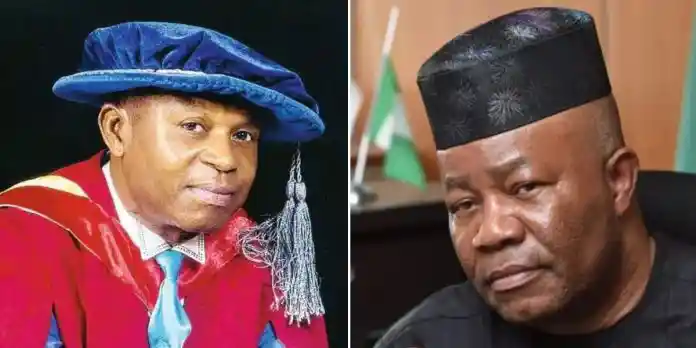Appeal Court Upholds 3-Year Sentence for Professor in Akpabio Election Rigging Case
- Advertisement -
Calabar, Nigeria – The Court of Appeal sitting in Calabar, Cross River State, has affirmed the three-year jail sentence handed to Professor Peter Ogban, a former Returning Officer in the 2019 Akwa Ibom North-West senatorial election, over his involvement in electoral fraud.
The decision by the appellate court reinforces the earlier judgement delivered by an Akwa Ibom State High Court sitting in Uyo, which in 2021 found the professor guilty of manipulating election results in favour of then-Peoples Democratic Party (PDP) candidate, and current Senate President, Godswill Akpabio.
This case, which has drawn public interest due to the involvement of a high-ranking academic, has become a watershed moment in Nigeria’s long battle against electoral malpractice.
- Advertisement -
Also Read : FG Issues Licences to 11 New Private Universities in Nigeria (Full List)
Background: Election Integrity on Trial
Professor Ogban, a lecturer in the Department of Soil Science at the University of Calabar, was engaged by the Independent National Electoral Commission (INEC) as a collation and returning officer during the 2019 general elections.
- Advertisement -
During the senatorial election in Akwa Ibom North-West, it was discovered that Ogban manipulated results from two local government areas — Oruk Anam and Etim Ekpo. According to court documents and prosecution evidence, he falsified the figures to favour Mr Akpabio by inflating the vote count by over 5,000 ballots in Oruk Anam alone.
His actions were not only illegal under Nigeria’s Electoral Act but were also seen as a gross betrayal of public trust, particularly coming from a respected member of the academic community.
The Initial Conviction
- Advertisement -
In March 2021, Justice Augustine Odokwo of the Akwa Ibom State High Court in Uyo found Ogban guilty of two counts: announcing false results and lying under oath. The professor was consequently sentenced to three years imprisonment without an option of fine and fined N100,000.
The conviction sent shockwaves across the academic and political landscape, sparking debate over the role of intellectuals in fostering democratic values. It also marked a rare instance in which an INEC official, especially someone of Ogban’s academic standing, was successfully prosecuted for electoral malpractice.
Appeal and Verdict
Unwilling to accept the High Court ruling, Ogban filed an appeal, seeking to overturn the conviction. His legal team argued that the evidence presented was circumstantial and that the burden of proof had not been met beyond a reasonable doubt.
However, the Court of Appeal dismissed his appeal on Wednesday, reaffirming that the evidence presented during the original trial was “overwhelming and credible.” The appellate court also criticized Ogban for abusing the public trust placed in him by INEC and the Nigerian electorate.
- Advertisement -
“This judgment sends a strong message to all electoral officers and stakeholders. Election rigging and manipulation of results will no longer be tolerated, no matter the rank or status of the perpetrator,” said a senior official in the judiciary who requested anonymity due to protocol constraints.
Akpabio Distances Himself from Convicted Official
Godswill Akpabio, the Senate President, has since publicly distanced himself from Professor Ogban, despite initially being the direct beneficiary of the falsified election results. In a statement released by his media office, Akpabio stated that he neither influenced Ogban nor solicited any help from him.
In fact, Akpabio claimed he was a victim of the electoral fraud, having eventually lost the 2019 senatorial election. He defected from the PDP to the All Progressives Congress (APC) shortly after and successfully contested and won the same seat in 2023 before emerging as the Senate President.
Observers, however, remain skeptical about the denial, arguing that the court ruling indirectly implicates the former minister in benefitting from a fraudulent process, whether he orchestrated it or not.
Electoral Reform and Public Reactions
The affirmation of Ogban’s conviction has been widely welcomed by civil society groups, election observers, and democracy advocates. Many see it as a step in the right direction toward sanitizing Nigeria’s electoral process.
“This verdict is a landmark. It confirms that our judiciary can indeed uphold justice in election-related offences. It also sends a powerful deterrent message,” said Idayat Hassan, director of the Centre for Democracy and Development (CDD).
Similarly, INEC officials have welcomed the judgement, expressing their continued commitment to conducting free, fair, and credible elections. “We will continue to work with law enforcement and the judiciary to weed out bad elements within the system,” said an INEC spokesperson.
Academic Community in Disbelief
The academic sector has also reacted with dismay and disappointment. Scholars and education stakeholders have lamented the damage the case has done to the reputation of Nigerian universities, already struggling with credibility issues.
“It is a national embarrassment. For a professor to be involved in such a despicable act undermines the ethics of academia,” said Professor Emmanuel Obot, a lecturer at the University of Uyo. “It’s even more appalling considering that he was supposed to serve as a neutral umpire.”
The Road Ahead
With this latest development, Nigeria’s judiciary has taken yet another step towards enforcing electoral laws and holding all parties accountable — regardless of their professional or political status.
However, many believe that a lot more still needs to be done to reform the electoral process. Legal experts have called for stronger institutional mechanisms to prevent such misconduct in the future, including better training and vetting of election officials.
As Nigeria inches closer to its next electoral cycle, the hope remains that such landmark rulings will serve not only as a deterrent but also as a catalyst for systemic change.
- Advertisement -


